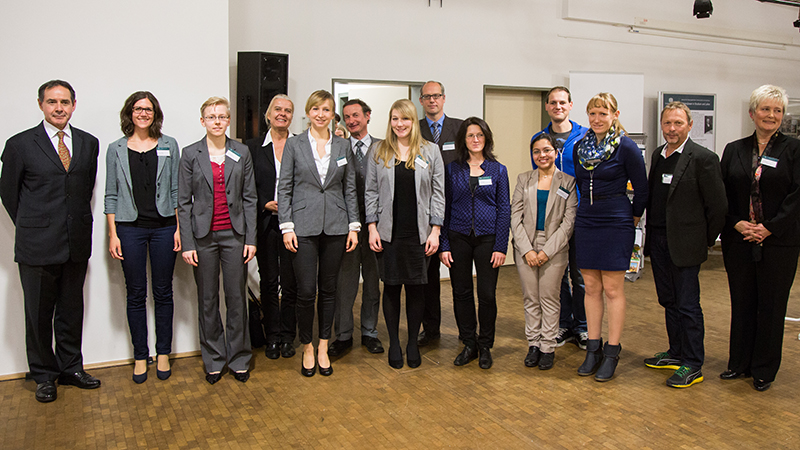The Science Calls
TU Chemnitz sets a signal for the promotion of young female scientists with the Eleonore-Dießner- and Marie-Pleißner-Prizes for outstanding final papers of the students
-

Among the first, who came to congratulate, were the Rector of TU Chemnitz, Prof. Dr. Arnold van Zyl (left) and the central equal opportunities officer of TU Chemnitz, Karla Kebsch (right). Photo: Steve Conrad
The proportion of women in the scientific qualification levels at German universities is growing steadily, but still a large number of students are adopted in the private economy sector after the receipt of the certificate. In order to motivate graduates to pursue a scientific career, scientific institutions create many incentives that should encourage the graduates remain in science. Thus, the Center for Equal Opportunities in Science and Research at Technische Universität Chemnitz praised for the second time a prize for outstanding theses of young female scientists. “In such way, on the one hand, we want to honor the young female scientists who have demonstrated with their final papers that they are particularly capable to work in a more result-oriented way at a field of research. On the other hand, we want to encourage them to continue along that path and to see them spending their career in science and to help innovatively shape our society“, says the central equal opportunities officer at TU Chemnitz, Karla Kebsch. The prize-giving ceremony took place on the 17th of November 2014 in “Altes Heizhaus with Rector of TU Chemnitz, Prof. Dr. Arnold van Zyl, the central equal opportunities officer and representatives of the faculties.
The prize winners, who have been proposed by the faculties, look back on a great variety of studies and professional experience; they all have one thing in common – a desire to embark on academic career. This is a dream of Sreetama Banerjee, graduate of the program in Micro and Nano Systems, who managed to come from India to Germany and TU Chemnitz. “My Master’s thesis posed several challenges and definitely sparked my curiosity to examine Physics behind hybrid nanoscale components“, she tells with pride. Besides her, the Eleonore-Dießner-Prize was awarded to Verena Loeck (Sustainable Supply Technologies), Janine Jeschke (Chemistry) and Susanne Lindner (Mathematics). Verena Loeck dealt with the social relevance of individual content of teaching during her studies, and strives for her doctoral degree, same as Janine Jeschke and Susanne Lindner. At the same time, they are aware of the fact that they belong only to a small circle of women, who choose this career path. “I hope that this award will encourage more women to access the doctoral studies and, therefore, I can welcome a few other female colleagues in our working group“, explained the graduate Janine Jeschke.
The Marie-Pleißner-Prize was received by Jasmin Gaudel (Sports Science), Jennifer Hohmann (Management & Organisation Studies) and Mirjam Gruhler (Intercultural Communication/Intercultural Competence). They also believe their future lies in science, in spite of the fact that they have already started their professional lives. Jasmin Gaudel is a sport therapist, which awakened in her the desire to investigate duct and walking motions of human beings in a scholarly way. A similar connection between practical experience and theoretical research want to tie Jennifer Hohmann and Mirjam Stricker. “Currently I find it particularly exciting to experience the differences, but also the similarities of theoretically generated knowledge and practice in everyday business. Therefore, it is tempting to seize the opportunities shown in the business and to do a doctorate alongside my work“, says Jennifer Hohmann, whose Master’s thesis was also given a rating of `very good´.
Key word: Eleonore-Dießner and Marie-Pleißner Awards
The eight faculties of TU Chemnitz on the one hand belong to the mathematical/technical/scientific area and, on the other hand, to the Social Sciences, Humanities, Economics and Business Administration. To find suitable criteria that allow the comparison of the final papers from all the faculties is not possible, and so the Equal Opportunities Commission has instituted two prizes last year and also found the suitable name givers. Eleonore Dießner was one of the first female-students at Hochschule für Maschinenbau Karl-Marx-Stadt, the forerunner of today’s TU Chemnitz. Upon obtaining her doctorate in 1969, which she successfully completed as one of the three women, she also worked as a researcher and was active as the Management Board of the working group ”Women in Engineering“ the Association of German Engineers in Saxony. Marie Pleißner, a teacher of German and Religion from Chemnitz, has deployed herself for a better education of women and their access to higher education. Both name givers are distinguished by their scientific and social merits, whereby they act as the female role models. The award should have a positive effect upon the academic life plans of graduates and facilitate the first steps towards the science with a prize of 800 euros. Not for nothing, besides the professional quality and interdisciplinary focus of the thesis, the jury takes also into account the social commitment of the nominees, as well as the visibility of scientific career aspirations.
Further information: Eleonore-Dießner-Prize: https://www.tu-chemnitz.de/gleichstellung/dießner_preis.php; Marie-Pleißner-Preis: https://www.tu-chemnitz.de/gleichstellung/pleißner_preis.php
(Author: Beatrice Berthel, Translation: Nataliia Boiko)
Katharina Thehos
24.11.2014




